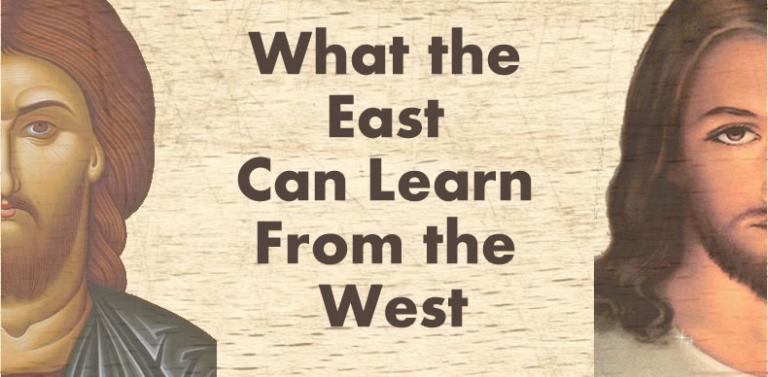Even though much of my own theology is influenced more by Eastern theology than Western theology, I have chosen to remain a Western Christian and joined the Latin rite when I entered the Catholic Church. I remained a Western Christian because I am a child of the West, and I truly believe that God has done some amazing things in the West. I did not want to turn my back on the rich tradition and language that formed so much of my own identity and within the Catholic Church I learned to love and appreciate my own Western Christian tradition a great deal more deeply. Here are a few things that I believe that Eastern Christians can learn from the West:
- Inculturation
The West is masterful at bringing together different cultures into the Church and drawing the riches of those cultures into their life without descending into strict ethnic stratification. This is never a simple process or one that completely free of conflict. There is still a scar of imperialism of certain parts of the world where the Church was wielded as a weapon, but in spite of this I am amazed at how many riches in the Church today have been gifted to us through the myriad cultures that have offered their gifts to Christ as they have received the good news of the Gospel. The West recognizes that every culture has a certain genius that God has worked within their life together. When the Western Church encounters these cultures they have the ability to offer the Gospel, and allow the culture to articulate it in the language of their own culture. This is a beautiful thing, and one that I am blessed to see in action so often. Gathering at the same table with people and cultures from every continent in tapestry of praise is a treasure beyond words and one of the reasons I am so thankful that I am Catholic. - A diversity of spiritual traditions
When I was discerning joining the Catholic Church I had the privilege of sitting down with one of the leading scholars of Orthodox Liturgical theology, David Fagerberg. Like me he had begun as a Lutheran, and like me he had been rocked by Orthodox liturgical theologians like Alexander Schmemann. I was surprised that in spite of all the Eastern Orthodox influence on his own life and theology that he had chosen to enter into the Catholic Church. I asked him why he had chosen to become Catholic instead of becoming Orthodox. I will never forget his answer. He told me that he wanted to have both Saint Symeon and Saint Francis. Although the East has a deep and rich spirituality, the West has an amazing variety of deep spiritualties which I have found to be a great blessing. I love being able to draw from the depths of the Ignatian spirituality of discernment, the Franciscan spirituality of simplicity, the Carmelite spirituality of mental prayer, the Cistercian spirituality of silence, and still draw from the spiritual wisdom of the East. - An Incarnational Wisdom
Although both East and West view the incarnation of Christ as the central event of Human history, the west is in many ways more incarnation focused than the East. This can be seen in the use of the crucifix as a central symbol in worship, it can be seen in the West’s willingness to change their calendar to better reflect the actual position of the earth in relationship to the sun, it can be seen in the West’s more realistic art and statuary, it can be seen in the West’s spirituality that is focused more on the historic events in the life of Jesus through prayers like the rosary and Ignatian contemplation. Too often these expressions of the faith are vilified by Eastern Christians, when in reality they could be great assets to the life of the Church of the East. I have been amazed over and over by the ways that Western spirituality has given me new eyes to see the sacredness of the world I live in and how marvelous it is that God choose to make himself tangible in the stuff of this world. Some of the times of greatest spiritual growth and life for me have come from praying the rosary on a walk through the city, or taking time for Ignatian contemplation by the side of a river. - Social Teachings & Social Actions
The West has thought deeply about how to live out Christ’s love in the world, and they have lived lives that reflect that love in powerful ways. The religious life of the West tends to be a bit more action oriented. Catholic monks and nuns are often at the forefront of Justice movements in the world. This is not to say that the East does not take part in social justice movements, or take action. They do! I am always grateful for the work of groups like Focus North America who do great work in service of those in need. However, I know that my own theology of social engagement has been a gift of the West. I think that Eastern Christians would be blessed if they engaged with categories of Western Social theology. These include:
– The Dignity of the Human Person
– The Common Good
– Subsidiarity
– Solidarity
Each of these categories has a great amount of depth and have helped me work though complex issues. They have given me criteria for judgment, the principles for fundamental values and have helped develop guidelines for action. This has been a true and rich gift of the Western Church in my work fighting Hunger.
This list does not mean to imply that the East does not have a rich heritage that affirms all of these things, it simply seeks to highlight areas of strength that the Western Church has. Here are a few examples of things that the West can learn from the East.












